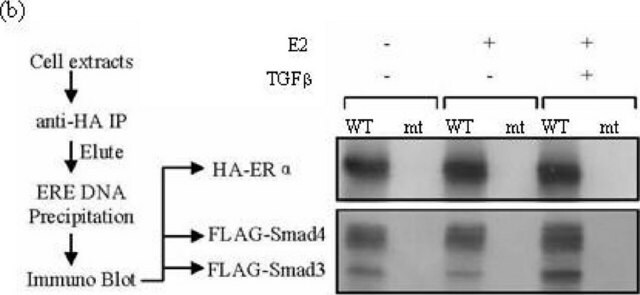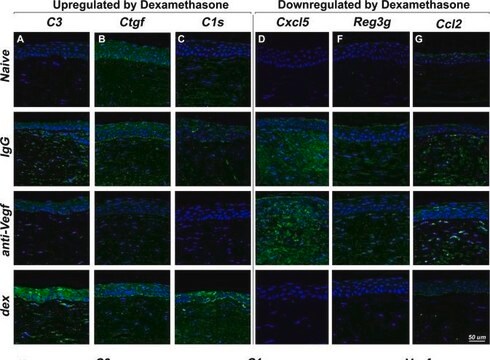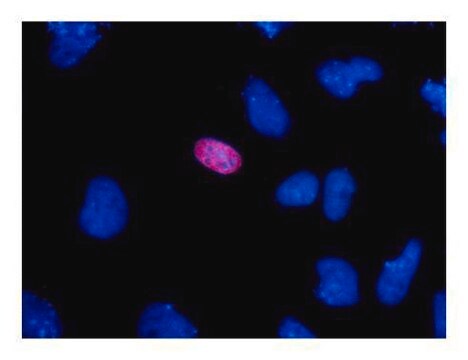Recommended Products
biological source
mouse
Quality Level
antibody form
purified immunoglobulin
antibody product type
primary antibodies
clone
monoclonal
species reactivity
vertebrates (common species)
manufacturer/tradename
Upstate®
technique(s)
immunocytochemistry: suitable
immunoprecipitation (IP): suitable
western blot: suitable
isotype
IgG3
shipped in
dry ice
target post-translational modification
unmodified
Related Categories
General description
Human influenza hemagglutinin (HA) is a surface glycoprotein required for the infectivity of the human virus. The HA tag is derived from the HA-molecule corresponding to amino acids 98-106 has been extensively used as a general epitope tag in expression vectors. Many recombinant proteins have been engineered to express the HA tag, which does not appear to interfere with the bioactivity or the biodistribution of the recombinant protein. This tag facilitates the detection, isolation, and purification of the proteins.
Specificity
Reactivity with other species has not been confirmed.
Recognizes HA tagged proteins overexpressed in cells, including both amino or carboxy-termini of targeted proteins in transfected mammalian cells.
Immunogen
KLH-conjugated, synthetic peptide corresponding to amino acids 98-106 of influenza hemaglutinin.
Application
Detect HA Tag using this Anti-HA Tag Antibody validated for use in IC, IP & WB.
Immunoprecipitation:
5 μg/mL of his antibody has been reported by an independent laboratory to immunoprecipitate recombinant HA-tagged fusion protein.
Immunocytochemistry:
5 μg/mL of this antibody has been reported by an independent laboratory to immunostain HA-tagged fusion protein.
5 μg/mL of his antibody has been reported by an independent laboratory to immunoprecipitate recombinant HA-tagged fusion protein.
Immunocytochemistry:
5 μg/mL of this antibody has been reported by an independent laboratory to immunostain HA-tagged fusion protein.
Research Category
Epitope Tags & General Use
Epitope Tags & General Use
Research Sub Category
Epitope Tags
Epitope Tags
Quality
Routinely evaluated by western blot of recombinant protein containing the HA-tag at the amino terminus in RIPA lysates from HEK293 cells.
Western Blot Analysis:
0.5-2 μg/mL of this lot detected a recombinant protein containing the HA-tag at the amino terminus in RIPA lysates from HEK293 cells.
Western Blot Analysis:
0.5-2 μg/mL of this lot detected a recombinant protein containing the HA-tag at the amino terminus in RIPA lysates from HEK293 cells.
Target description
Various
Linkage
Replaces: 07-221
Physical form
Format: Purified
Protein A purified
Purified mouse monoclonal IgG3 in buffer containing PBS, pH 7.4 containing 0.05% sodium azide.
Storage and Stability
Stable for 1 year at -20°C from date of receipt.
Handling Recommendations:
Upon first thaw, and prior to removing the cap, centrifuge the vial and gently mix the solution. Aliquot into microcentrifuge tubes and store at -20°C. Avoid repeated freeze/thaw cycles, which may damage IgG and affect product performance.
Handling Recommendations:
Upon first thaw, and prior to removing the cap, centrifuge the vial and gently mix the solution. Aliquot into microcentrifuge tubes and store at -20°C. Avoid repeated freeze/thaw cycles, which may damage IgG and affect product performance.
Analysis Note
Control
RIPA lysates from HEK293 cells.
RIPA lysates from HEK293 cells.
Other Notes
Concentration: Please refer to the Certificate of Analysis for the lot-specific concentration.
Legal Information
UPSTATE is a registered trademark of Merck KGaA, Darmstadt, Germany
Disclaimer
Unless otherwise stated in our catalog or other company documentation accompanying the product(s), our products are intended for research use only and are not to be used for any other purpose, which includes but is not limited to, unauthorized commercial uses, in vitro diagnostic uses, ex vivo or in vivo therapeutic uses or any type of consumption or application to humans or animals.
Not finding the right product?
Try our Product Selector Tool.
Storage Class Code
10 - Combustible liquids
WGK
WGK 2
Certificates of Analysis (COA)
Search for Certificates of Analysis (COA) by entering the products Lot/Batch Number. Lot and Batch Numbers can be found on a product’s label following the words ‘Lot’ or ‘Batch’.
Already Own This Product?
Find documentation for the products that you have recently purchased in the Document Library.
Customers Also Viewed
Verena Supper et al.
Journal of immunology (Baltimore, Md. : 1950), 196(3), 1387-1399 (2016-01-06)
The Ig superfamily member CD147 is upregulated following T cell activation and was shown to serve as a negative regulator of T cell proliferation. Thus, Abs targeting CD147 are being tested as new treatment strategies for cancer and autoimmune diseases.
A rapid and efficient immunoenzymatic assay to detect receptor protein interactions: G protein-coupled receptors.
Zappelli, E; Daniele, S; Abbracchio, MP; Martini, C; Trincavelli, ML
International Journal of Molecular Sciences null
Madalina Raducu et al.
The EMBO journal, 35(13), 1400-1416 (2016-05-29)
Skp1-Cul1-F-box protein (SCF) ubiquitin ligases direct cell survival decisions by controlling protein ubiquitylation and degradation. Sufu (Suppressor of fused) is a central regulator of Hh (Hedgehog) signaling and acts as a tumor suppressor by maintaining the Gli (Glioma-associated oncogene homolog)
H Wu et al.
Neuroscience, 170(1), 149-155 (2010-07-06)
Previous studies have demonstrated that merlin acts as a tumor suppressor by blocking Ras-mediated signaling. However, the mechanism by which merlin controls cell proliferation has remained obscure. Here we show that merlin deficient tumors exhibited loss of p21, concomitant with
Patrick Guye et al.
Nature communications, 7, 10243-10243 (2016-01-07)
Human induced pluripotent stem cells (hiPSCs) have potential for personalized and regenerative medicine. While most of the methods using these cells have focused on deriving homogenous populations of specialized cells, there has been modest success in producing hiPSC-derived organotypic tissues
Our team of scientists has experience in all areas of research including Life Science, Material Science, Chemical Synthesis, Chromatography, Analytical and many others.
Contact Technical Service













